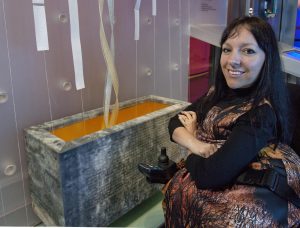Esther Fox

Esther Fox
Esther Fox is a programme director, artist and researcher, interested in exploring the synapses between science, art, heritage and ethics. In 2009 she was appointed by Screen South to lead the Accentuate Programme www.accentuateuk.org one of Screen South’s portfolio of projects, creating opportunities for deaf and disabled people to participate and lead in the cultural sector. As part of the Accentuate programme, she is the Project Manager and Co Investigator on a major Arts and Humanities Research Council project, Disability and Community: Dis/engagement, Dis/enfranchisement, Dis/parity and Dissent (the D4D project). Her research interests lie in the ethical problems presented by the current genetic screening debate. In particular, how socially engaged arts practice and interpretations of Utopian Futures as represented in Science Fiction, provide opportunities to problematise the current stance on genetic screening as being entirely positive. Alongside her research interests she is a practicing visual artist and was commissioned in 2016 by The Science Museum, London, to create a new work of sculpture, Pandora’s Box, bringing together research by Dr Felicity Boardman and conceptual arts practice, asking visitors to contemplate the value of life and the role of the Dr/Philosopher.
Reframing Utopian Futures: How can disabled activists problematise the pro-screening debate?
I am interested in how looking towards genres outside of medical science, such as socially engaged arts practice, film and digital gaming, can enable an alternative critique of utopian arguments. In my keynote I will be discussing three interconnecting issues: (1) new eugenics, (2) science fiction and Gaming and (3) contemporary socially engaged arts practice. My purpose is to problematise the pro-screening debate; in order to reposition and reframe pro-screening as a dystopian movement, but one that ‘passes’ as utopian.
In medical discourse genetic screening is only described in positive terms, as beneficial for society, a mechanism to eliminate suffering. However, I would propose that it is essential for the pro-screening debate that it is sanitised in this way. Science Fiction offers us a lens to see what could actually be at the heart of the race to eliminate disability; and that is fear (of the unknown, of the unsightly, of the unproductive). Medical science subsumes all other views within its orbit, yet it is ill equipped to predict the wider sociological impacts which may occur with the reduction or abolition of genetic “abnormality”.
Science Fiction affords us a freedom to reveal what often goes unsaid within “mainstream” society. Taken to its conclusion
“Eugenic Logic tells us that we can avoid disability and even eliminate it from the human condition. This understanding of disability as somehow detachable from human life rather than essential to it fosters the idea that disability does not have much to do with us unless we have the misfortune of having it descend upon us”. Garland-Thomson. Bioethical Inquiry (2012) p342
Science fiction enables us to imagine the future before it happens: an early warning system outlining inherent dangers in those prophesies, or in contrast, the promise of benefits and enhancements. The exposure of these societal constructs demonstrated through films such as Gattaca could give disabled activists an alternative method to problematise the Utopian pro-screening debate.
Socially engaged arts practice also offers an opportunity to engage the wider public in the ethical issues relating to screening that otherwise may be seen to be too difficult to broach. In this presentation I will discuss my collaboration with Dr Felicity Boardman (University of Warwick) and how as a result of this collaboration, I created a new piece of sculpture “Pandora’s Box”, exhibited at the Science Museum (2016). Currently through the AHRC funded D4D project I am exploring how new technologies (particularly virtual reality) and gaming, can open up immersive experiences that can encourage the public to challenge their views on value, categorisation and order.